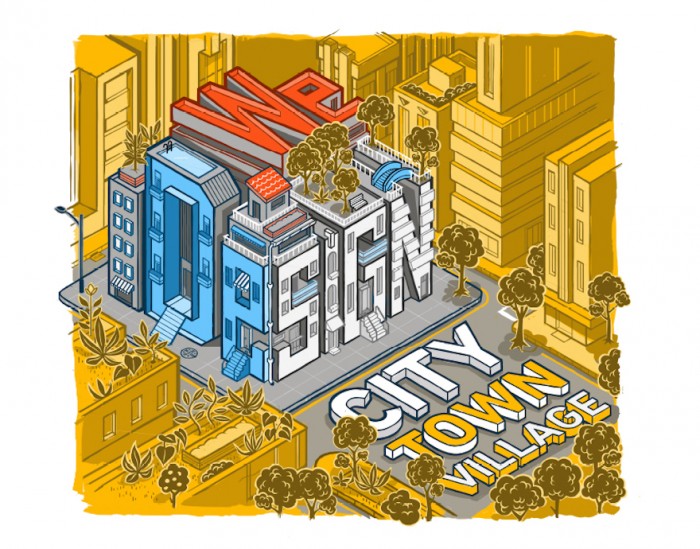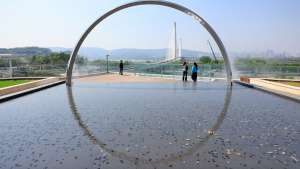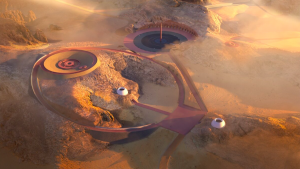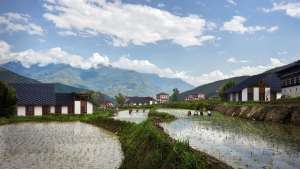
This July Durban is hosting the inaugural We Design Conference, with a particular focus on the radical transformation of South Africa’s cities, towns and villages. South Africa's economic growth is currently estimated to be just 0.5 per cent, which – according to the festival's co-organiser Andrew Makin from DesignWorkShop – is perhaps a generous way of saying zero. This leaves the country in rather dire straits, with joblessness increasing, poverty deepening and inequality gaps widening. In this kind of environement civil unrest and crime will surely worsen. Much of the country is preooccupied with how to change this, but few people are able to come up with solutions.
As well as a panel of urban-minded South African speakers, the We Design Conference is bringing in Felipe Leal, immediate past Minister of Urbanism for Mexico City and Kelvin Campbell, chair of Smart Urbanism in London to join the debate. We talk to organiser Makin about the motivations behind the conference and what they hope to achieve.
Is this the first We Design event?
This is the first We Design Conference, but it’s the fifth in the New Paradigms series dating back to 2004.
Have the New Paradigm events previously focused on a different design issue?
As time’s moved along the conference has become increasingly ambitious, increasingly exploring the potential of the spatial environment to enable radical change. The first conferences focussed on architectural education, on the connection between educational institutions and the profession. Now it’s interested in engaging in the world we all inhabit, the elements of our reality that impact us most fundamentally.
Why the focus on urban planning this year - did something particular trigger the need for debate now?
A tipping point has been reached across the world. It’s now irrefutable that cities are the only place where economies meaningfully grow, particularly those that provide opportunities for the greatest range and numbers of people. Manufacturing is increasingly mechanised and highly skilled, agriculture increasingly corporatised, mining is a shrinking employer, intenstive IT is very geographically localised. But the simultaneously dense, diverse, well connected city is a kind of machine for super-diverse exchange of any sort. It offers economic opportunities from the most basic to the most sophisticated, often extending inherent social and cultural practice into economic potential. But in SA we continue to perpetuate sub-urbanisation across all economic layers. This is a windfall for big business - the Mall of Africa is a most striking example of this relationship. The consequence of this equation is continuously increasing job losses, more poor people, and greater wealth disparity.
If we keep going in this direction, we’re going off the cliff within the next decade.
This is why the city as an enabler of radical change is the theme for this year, and quite likely for some time to come.
How did you curate your speakers?
We wanted a combination of political, contextual and technical expertise together with theoretical and practical experience, all with direct and personal understanding of the kinds of conditions we have in South Africa. That means a colonial past, an historically privileged minority, an indigenous majority, and a democratic revolution.
Who are you most excited to hear from?
We’re excited to hear from Minister Pravin Gordhan because he has the principal mandate to grow our economy and has a spatial history in the Durban Housing Action Group, from immediate past Minister of Urbanism and Housing in Mexico City because he initiated a public space strategy that led directly to economic growth, from Kelvin Campbell because he has a South African background and chairs a highly respected Urban Research group in London, and from numerous local speakers who are totally connected into the realities of everyday South African life and the fundamentals of why the perpetuated physical legacy of apartheid is absolutely central to it being unbelievably difficult for the majority of South African’s to achieve economic freedom without which there is no freedom at all.
Will there be any physical results from the event? After the discussions do you have plans for any action?
We will propose and lobby for government, business and labour to support the implementation of a series of specific projects that when implemented will directly catalyse the kind of radical change essential to our collective future.
Why in Durban?
Mainly because the KZNIA represents the region and is head-quartered in Durban. It is also useful that Durban has a well defined inner city core that is also well connected to it’s periphery; that it has a moderate population size that’s small enough to impact and big enough to be an example to our other metros; that the population is about as diverse as the whole country; and that the huge 2014 International Union of Architects Conference hosted in Durban provides a great deal of momentum to the initiative.
Can you tell me one example of how the urban planning in South African cities is in radical need of a rethink?
We are all so physically far from each other at very low average densities that every kind of service delivery is extremely costly, inefficient, ineffective and almost impossible to maintain and sustain.
Another is that cars are privileged and catered for above pedestrians which fundamentally disables micro and small business, dousing the flames of entrepreneurial spirit which is the wellspring of broad-based economic growth.
Do you think people assume issues involving space and the city are permanent (because they in the built environment) rather than being seen as something that can and should change?
The immense construction footprint that has sprawled out from almost every city, town and village in South Africa since 1994 is a very onerous form of permanence. But unless our economy totally tanks, it is unlikely that there will not be more construction ongoing into the future. So although we have continued to dig our own graves for 20 years, if we fundamentally change direction now we will progressively reverse the effective damage and simultaneously construct a much more enabling future.
Are the government and city officials from Durban excited to be participating?
The city in in the process of preparing a major urban plan with which this conference is in strong alignment. There are therefore many officials who are excited to participate. There is also a major exhibition of the city markets precinct on at the Venice International Architecture Biennale - the world’s biggest architecture show - from May to December this year, which is an extraordinary example of exactly how economically, socially and culturally productive and egalitarian the city really can be.
What do you think South Africa can learn from London and Mexico City?
How there is almost no possibility of us growing our economy to reduce poverty, create job opportunities, and achieve functional social cohesion without completely changing our settlement patterns to more resemble theirs: dense, functionally and economically diverse, well connected, with fantastic public space for everyone.
The We Design 2016 event takes place on 8 July 2016. For more information and for tickets go to the We Design 2016 website.






